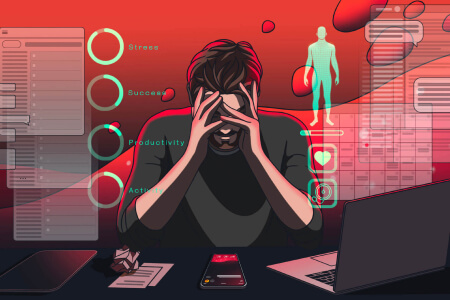
Stress & Energy. Tracking and reducing stress with Welltory HRV
We calculate your level of physical stress and energy based on the evaluation of heart rate variability.
Home » Stress & Energy » How to manage stress

Stress has multiple effects on all the systems in your body. All of them can suffer from it and each has its own response.
As you can see, stress affects your body in more than one significant way, and if you want to avoid future problems and health complications, you need to start learning to manage your stress.
Because we are all different.
We all have different life experiences, capacities for physiological resistance to various types of stress, present states of wellness and mood, psychological features, and such differences as age and gender.
Men and women have different ways of looking at problems. Studies among psychotherapists in the UK have shown that men often need help with problems at work, and they need to find a quick solution to cope with the strain. Women are more likely to worry about relationships and health. They need to talk about their feelings in detail more often.
People who work in different positions also experience varying levels of stress. A subordinate’s stress level will increase as their work becomes less independent. Bosses experience pressure from below: The greater their responsibility for employees, the higher their stress levels.
There is a theory about Type A people. Type A people are usually impatient, irritable, and hostile. They like to be number one at any cost. They have a higher risk of cardiovascular diseases because, in times of difficulty, they are more prone to smoke, drink, and consume more carbohydrates than Type B people.
Overcoming stress also depends on one’s sex, age, life experience, and a million other things.
British scientists found that almost a third of men use sex or porn to combat emotional and mental stress, while more than half of women experience a compulsion to eat.
There are completely “impenetrable”, stress-resistant people, who don’t care about stress at all. They know that in reality a lot of things depend on them. Even if their situation seems unbeatable to an outside observer, they still find things they can control. They don’t always take responsibility for things beyond their control, but look instead for ways to improve their immediate situation.
When you make a presentation to an investor, think about why you started this project and what your aim is. When you prepare for an important presentation:
At the presentation:
Distinguish small panic before an important event from regular panic, for example, before going out on the street or in the metro. These are so-called panic attacks, and they are reason to make an appointment with a doctor.

When you often feel anxiety, fear, or worry about everything — you are experiencing emotional stress.
Use these tips to reduce emotional strain:
Here are some apps that will help you calm down and reduce your emotional stress: Headspace, MyLife Meditation.
Anxiety and stress, connected with the lack of control, only make the situation worse. They affect the prefrontal cortex, responsible for judgement and insight, and lead to a decrease in productivity and feelings of frustration.
Fortunately, there are ways to deal with this feeling and gain at least some control:

It depends on your condition and what has caused your physical stress.
There are many reasons for chronic physical stress, such as spending long periods of time in tensed positions, hard physical work or exercise, and physical reactions to mental stress. Long-term physical stress can even lead to tension headaches and other health problems that limit your functioning. Try some methods of stress-management that you can employ to prevent and cope with stress before it jeopardizes your health.
Use active physical recovery:
When you feel really bad, choose a passive recovery technique:
Pay attention to your food. Check if you have enough nutrients. Don’t let junk food and sweets bog you down and increase your anxiety hormones. If you have just a couple of free hours a week try a massage course, flotation (imitation of weightlessness in very salty water), visit the sauna or steam room.
Check your stress and energy level with the Welltory app after the stress-relief techniques to understand which one works better for you.

Stress-related eating may add pounds to your weight. You can still try to take off some stress with food, it is just better to learn how to choose the right foods.
Physical activity to resolve stress:
Try different techniques to resolve stress and measure the results with the Welltory app.
Track your stress.
It’s like in sports. If you want to improve your results you have to track and analyze them. So it is with stress. If you want to find the ideal method for you, you need a way to track your stress. The answer is Welltory — the quick and convenient way to stay informed of your body strain, thanks to the Heart Rate Variability (HRV) method.
In some situations, we can’t feel the strain on our body. Therefore, we may underestimate or overestimate the effectiveness of some methods. For example, in our practice there are already several users who have significantly reduced their alcohol consumption because they saw evidence that it didn’t help with stress, but increased it. Some users changed their schedule to get enough sleep or started practicing mindfulness every day because it really does reduce one’s stress level.
Use these tips to find the ideal method for you:
Experiment with Welltory. It will help you to develop your own strategy for coping with stress.
Welltory Team, 23 Dec. 2021

We calculate your level of physical stress and energy based on the evaluation of heart rate variability.

Professional burnout is a result of long unresolved job stress and it has become a popular diagnosis recently. Find out if you are at risk and how to avoid it.

77% of our users experience fatigue, and the main reason is lack balance between stress and recovery. Learn to manage your energy and avoid fatigue.
 App Store
App Store
 Google Play
Google Play
 Huawei AppGallery
Huawei AppGallery
 Galaxy Store
Galaxy Store







